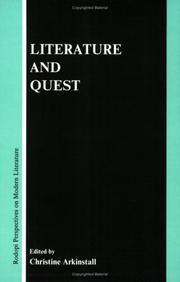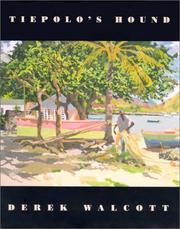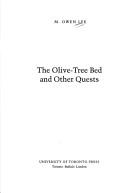| Listing 1 - 10 of 41 | << page >> |
Sort by
|

ISBN: 9004656456 9051835159 Year: 1993 Publisher: Amsterdam : BRILL,
Abstract | Keywords | Export | Availability | Bookmark
 Loading...
Loading...Choose an application
- Reference Manager
- EndNote
- RefWorks (Direct export to RefWorks)
What does the word "quest" conjure up? A journey in the hope of fulfillment, an exploration of identities, questions, the nature of research itself, or the darker side of quest in the form of conquest, colonisation and displacement? These are some of the threads taken up and developed in this collection of essays by established and emerging scholars. Germaine Greer, Italo Calvino, Umberto Eco, Serge Doubrovsky, A. S. Byatt, Novalis, Melville, Valéry, Beckett, Stanislao Nievo, Victor Segalen, Sibilla Aleramo, Dacia Maraini, Defoe, Tournier, Coetzee, Sor Juana Inés de la Cruz, Cintio Vitier, Domingo del Monte, Ramón de Palma, Pablo Armando Fernández, Hubert Aquin, Anne Hébert , Homer, Proust, Balzac and Robbe-Grillet provide the literary voices that invite these scholars to embark on their own quests into subjects as diverse as the relationships between texts, authors and readers, the initiatic journey, spirituality and enlightenment, female autobiography and identity, oppression, imperialism and postcolonial discourses, not to mention the history of the quest itself. The result is a rich tapestry of thought-provoking insights into the inexhaustible connections between literature and quest.
Book
ISBN: 9781529344004 152934400X Year: 2023 Publisher: London Hodder & Stoughton
Abstract | Keywords | Export | Availability | Bookmark
 Loading...
Loading...Choose an application
- Reference Manager
- EndNote
- RefWorks (Direct export to RefWorks)
Long before books were mass produced, those made of reeds from along the Nile were worth fighting and dying for. Journeying along the battlefields of Alexander the Great, beneath the eruptions of Mount Vesuvius, at Cleopatra's palaces and the scene of Hypatia's murder, award-winning author Irene Vallejo chronicles the excitement of literary culture in the ancient world, and the heroic efforts that ensured this impressive tradition would continue. Weaved throughout are fascinating stories about the spies, scribes, illuminators, librarians, booksellers, authors, and statesmen whose rich and sometimes complicated engagement with the written word bears remarkable similarities to the world today: Aristophanes and the censorship of the humourists, Sappho and the empowerment of women's voices, Seneca and the problem of a post-truth world. Vallejo takes us to mountainous landscapes and the roaring sea, to the capitals where culture flourished and the furthest reaches where knowledge found refuge in chaotic times. In this sweeping tour of the history of books, the wonder of the ancient world comes alive and along the way we discover the singular power of the written word.
Books --- Quests (Expeditions) --- History

ISBN: 0191861731 0820346470 9780820346472 1306269318 9781306269315 0820323071 9780820323077 082034608X 9780191861734 Year: 2002 Publisher: Athens
Abstract | Keywords | Export | Availability | Bookmark
 Loading...
Loading...Choose an application
- Reference Manager
- EndNote
- RefWorks (Direct export to RefWorks)
This new edition brings to life Tobias Smollett's fourth novel, The Life and Adventures of Sir Launcelot Greaves . No annotated edition of the work existed before the second half of the twentieth century, and this comprehensive edition by Robert Folkenflik and Barbara Laning Fitzpatrick features more accurate text as well as scrupulous textual and critical information. Also included in the detailed introduction is a unique examination of Sir Launcelot Greaves, the first illustrated serial novel, in relation to the engravings by Anthony Walker. Sir Launcelot Greaves was a groundbreaking novel f
Mentally ill --- Quests (Expeditions) --- Knights and knighthood
Book
ISBN: 9781552453797 1552453790 Year: 2019 Publisher: Toronto Coach House Books
Abstract | Keywords | Export | Availability | Bookmark
 Loading...
Loading...Choose an application
- Reference Manager
- EndNote
- RefWorks (Direct export to RefWorks)
Quests (Expeditions) --- Male friendship --- Ontario --- Botanists --- Travel

ISBN: 0374105871 Year: 2000 Publisher: New York, N.Y. Farrar, Straus and Giroux
Abstract | Keywords | Export | Availability | Bookmark
 Loading...
Loading...Choose an application
- Reference Manager
- EndNote
- RefWorks (Direct export to RefWorks)
American literature --- Painters --- Painting --- Quests (Expeditions) --- West Indians
Book
ISBN: 160699347X 9781606993477 Year: 2010 Publisher: Seattle, WA Fantagraphics
Abstract | Keywords | Export | Availability | Bookmark
 Loading...
Loading...Choose an application
- Reference Manager
- EndNote
- RefWorks (Direct export to RefWorks)
"One day Millennium Boy decided to grab his hobo stick, his bandana, and his Swiss Army knife, bid his mom goodbye, and head off on a quest for adventure. He is soon joined by his best friend Steve (weapon: baseball bat), and the duo find themselves victors in a battle with two other adventure seekers, which automatically upgrades their weaponry (a crowbar and a steel chain are added to their arsenal)-- and on they trek until they meet the next inductee to their group, the muscle-bound Lash Penis. And then things start getting weird. Joe Daly's latest graphic novel mimics the narrative propulsion of a role playing game, and therein lies its-- and its author's-- genius. Our jolly band of ne'er-do-wells journey blithefully along, confronting a series of hilarious but increasingly hostile menaces, accumulating points and weapons, eventually recruiting Nedgirl the Archer, who adds a little female energy to their improvisatory family of happy-go-lucky hooligans"--Page 4 of cover.
Adventure and adventurers --- Comic books, strips, etc --- Friendship --- Quests (Expeditions)

ISBN: 9781442678064 1442678062 9780802041388 0802041388 0802079849 9780802079848 1282025503 9786612025501 Year: 1997 Publisher: Toronto
Abstract | Keywords | Export | Availability | Bookmark
 Loading...
Loading...Choose an application
- Reference Manager
- EndNote
- RefWorks (Direct export to RefWorks)
In The Olive-Tree Bed and Other Quests, the fourth in the series of Robson Lectures published by the University of Toronto Press, Father Lee studies the quest myth as it occurs in Homer's Odyssey, Virgil's Aeneid, Wagner's Parsifal and Goethe's Faust. Though the four works represent four different genres - oral epic, written epic, music drama, and poetic drama - each deals with the finding of an elusive goal attainable only by the hero called to find it. The questing for the olive-tree bed, the Golden Bough, the Holy Grail, and the Eternal Feminine is, at the deepest level, the hero's search to find the meaning in his life. Though Father Lee's lectures address critical problems in the four works, and draw to some extent on Jungian insights, this volume is also a personal memoir written in the belletristic style for which its author has become known. Father Lee wears his learning lightly, and his writing changes from chapter to chapter as it reflects, in turn, the clarity and naïve sense of wonder in Homer, the darkness and ambivalence in Virgil, the intuitive mysticism of Wagner, and the riotously imaginative exuberance of Goethe. Each of the four quests comes eventually to be seen as every person's search to discover himself - for the journey of the hero is the myth each of us is called to live.
Book
ISBN: 1283665999 1782040366 1843843285 Year: 2012 Publisher: Cambridge : D.S. Brewer,
Abstract | Keywords | Export | Availability | Bookmark
 Loading...
Loading...Choose an application
- Reference Manager
- EndNote
- RefWorks (Direct export to RefWorks)
"Offers the first full study of the allegorical knightly quest tradition from the Middle Ages to the Renaissance. Richly satisfying, as impressive in the detail of its scholarship as in the elegance of its critical formulations. It seamlessly moves between different literary traditions and across conventional period boundaries. In Dr Nievergelt's treatment of this theme, the successive retellings of the tale of the knight's quest come to stand as an emblem of shifting values and norms, both religious and worldly; and of our repeated failures to realise those ideals." Dr Alex Davis, Department of English, University of St Andrews. The literary motif of the "allegorical knightly quest" appears repeatedly in the literature of the late medieval/early modern period, notably in Spenser, but has hitherto been little examined. Here, in his examination of a number of sixteenth-century English allegorical-chivalric quest narratives, focussing on Spenser's 'Faerie Queene' but including important, lesser-known works such as Stephen Bateman's 'Travayled Pylgrime' and William Goodyear's 'Voyage of the Wandering Knight', the author argues that the tradition begins with the French writer Guillaume de Deguileville. His seminal 'Pèlerinage de la vie humaine' was composed c.1331-1355; it was widely adapted, translated, rewritten and printed over the next centuries. Dr Nievergelt goes on to demonstrate how this essentially "medieval" literary form could be adapted to articulate reflections on changing patterns of identity, society and religion during the early modern period; and how it becomes a vehicle of self-exploration and self-fashioning during a period of profound cultural crisis. Dr Marco Nievergelt is Lecturer (Maître Assitant) and SNF (Swiss National Science Foundation) Research Fellow in the English Department at the Université de Lausanne.
Quests (Expeditions) in literature. --- English literature --- Quests in literature --- History and criticism.
Book
ISBN: 0340106247 9780340106242 Year: 1972 Publisher: London: Hodder and Stoughton,
Abstract | Keywords | Export | Availability | Bookmark
 Loading...
Loading...Choose an application
- Reference Manager
- EndNote
- RefWorks (Direct export to RefWorks)

ISBN: 3906766845 9780820456003 9783906766843 0820456004 Year: 2001 Publisher: Oxford: Lang,
Abstract | Keywords | Export | Availability | Bookmark
 Loading...
Loading...Choose an application
- Reference Manager
- EndNote
- RefWorks (Direct export to RefWorks)
La Queste del Saint Graal is one of the best-known and most important of the medieval Grail Romances, being the first text to portray the character of Galahad the «perfect» knight, and the earliest extant version of the tale to attempt to fuse the dual tradition associated with the Grail: pseudo-Celtic and Christian. However, it is often considered a difficult text, containing passages of dense metaphor and a seemingly disjointed plot. This study explains the link between metaphor and structure within the text, by means of detailed analysis of certain key sections of the narrative, showing how the author has carefully constructed a hierarchy of characters. What also emerges is that the author places the reader in a position analogous to that of the questing knights, struggling to understand the adventures with which they are presented, and able to do so insofar as they have grasped the symbolic significance of earlier events in the story. The literary technique of structuring a text by means of metaphor is employed not only in La Queste del Saint Graal, but is characteristic of much medieval narrative: thus this analysis has implications for the interpretation of other examples of the genre.
Grail --- Arthurian romances --- Knights and knighthood in literature. --- Quests (Expeditions) in literature.
| Listing 1 - 10 of 41 | << page >> |
Sort by
|

 Search
Search Feedback
Feedback About UniCat
About UniCat  Help
Help News
News